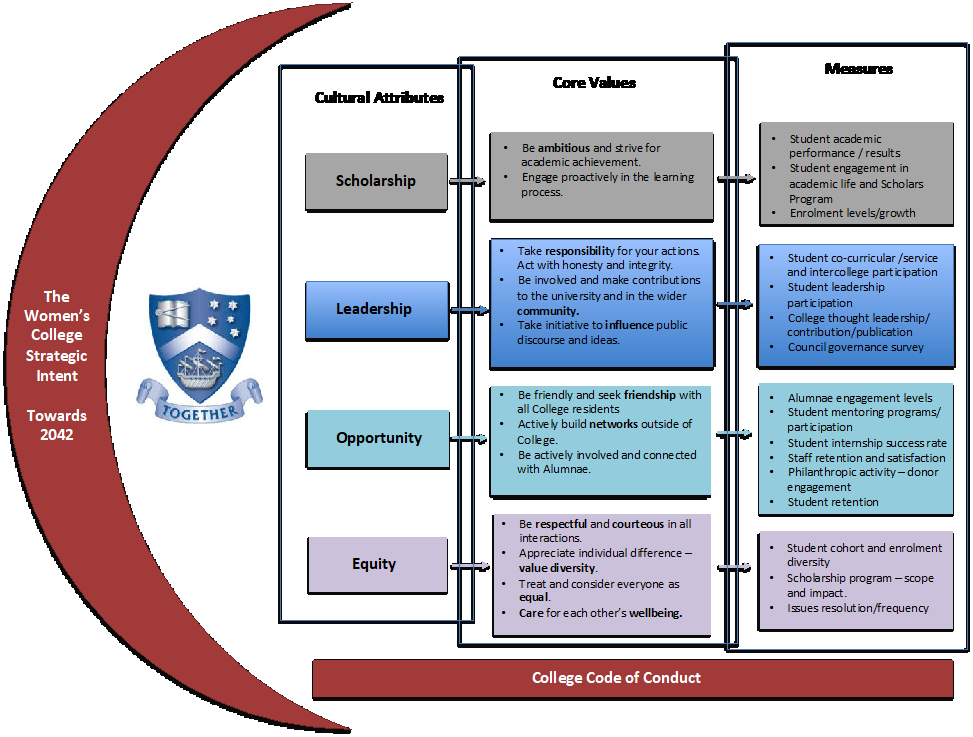CODE OF CONDUCT FOR STAKEHOLDERS & VISITORS
Introduction
This Code of Conduct (the “Code”) applies to:
- External visitors to the College, and
- Stakeholders of the College, including parents[1], alumnae, council members and members of the University and wider community, including independent hirers of the facilities and their guests.
This Code is designed as a guide for stakeholders and visitors to the College in their dealings with the staff and students of the College, as well as with other community members. The Code is written in line with the College’s values and culture (Appendix B). It sits alongside other policies and procedures of the College.
The Code
Each person, as described in the Introduction above, is expected to:
- Support and uphold the College, its reputation, values, standards and policies in relation to all aspects of the College community.
- Model positive and inclusive behaviour, especially in relation to respecting diversity in all its forms. This includes treating all members of the College community with impartiality and sensitivity.
- Engage in polite and courteous communication with College staff, in a spirit of mutual respect.
- Refrain from using accusatory, insulting, aggressive or harassing language when communicating with College personnel[2], or engaging in behaviour that could be construed as bullying.
- Act honestly and ethically in their dealings with the College, and honour any financial commitments to the College.
Appendix A
Parents/Guardians
Under Australian Privacy Laws, individuals over the age of 18 have a right for their personal
information to remain private. While the staff of the College recognise that parents/guardians
have a strong and understandable interest in the academic progress and well-being of their
daughter/s, owing to Privacy constraints staff may not be able to discuss information about a
student’s enrolment, their personal or academic affairs with parents/guardians unless the student
is deemed to be at personal risk.
The College values a community environment that fosters intellectual curiosity and growth,
promotes and models good citizenship, encourages enlightened leadership and respects each
individual. Each student at Women’s College is learning to become an independent thinker and
self-advocate; to make decisions and learn from them, and to take responsibility for her own
learning. We ask that parents support their daughter’s developmental process by encouraging her
to initiate dialogue with staff in solving problems and expressing ideas.
It is normal and natural for parents to advocate for their daughter and we welcome questions
from parents; however, we will work directly with our students in exploring situations of concern
and potential solutions. While it may seem easier in the short term for parents to “solve the
problem” for their daughter when they arise, this does not always allow for a learning experience
on how to negotiate, manage conflict or advocate for oneself. Parents should encourage their
daughter to contact the appropriate university faculty member or staff member to start the
discussion if there is an academic issue. College staff can assist in pointing students in the right
direction.
If a student has a College-based concern or complaint, they should speak to a staff member who
can take them through their options under the College’s policies.
Serious health and well-being matters relating to a student, where that student is deemed at risk,
will be discussed with parents/guardians.
Appendix B: Summary of College Culture and Values

[1] Appendix A relates to an extension of this Code specifically for parents/guardians.
[2] College “personnel” refers to staff, students, Council members and volunteers.



